裕兴新概念学习笔记 第一册(29-30)
新概念一lesson29-30知识点全析(祈使句)

3.make the bed 整理床铺 make a cake 做蛋糕 What’s the make of your car? 你的车是什么牌子的?
make the bed
sweep the floor
dust the desk
三 语法讲解
祈使句:用来表示命令、请求、建议… (1).表命令:V-原形+… Shut the door. (2).表请求:Please +V-原形 Please give me it. (3).表建议:Let’s+V-原形 Let’s go,ok?
215.read v.读 看书 看报 read book read newspapers
看杂志 rarpen v.削尖,使锋利 adj. + en = v. sharp (adj.锋利的) +en = v.使锋利 short (adj.短的) + en = v.缩短 weak (adj.弱的) + en = v.削弱
206.must 必须,应该 情态动词---情感,态度 You must go out. Can you go out?
情态动词+v-原形
207.open v.打开 Open the window. The window is open.
adj.开着的
208.air v.使…通风,换换空气 n.空气 The air is fresh. 空气清新。 Open the window and air the kitchen. 打开窗户,让厨房通下气。 color air milk
217.put on 穿上 戴上(眼镜,首饰 ,手套…) put on the coat 218.take off 脱掉 取下(眼镜,首饰,手套…)
新概念英语第一册29-30

A B C D E
Then make the bed. Dust the dressing table. Open the window and air the room. Then sweep the floor. Then put these clothes in the wardrobe.
Lesson29 Come in, Amy.
• Do you do housework at home? • What do you do for your
parents?
Question: How must Amy clean the floor? Is the bedroom clean or dirty?
e.g.
Put the apple in my bag.
shut [ʃʌt] v. 关 = close V.关 Shut the door behind you. 随手关门。
• put
v. 放置
• clothes n. 衣服
• wardrobe n . 衣柜
• dust ① v. 掸掉……上的灰 • ② n. 灰尘 • sweep v. 扫
• open v. 打开 • air [ɛə] v. 使~通风,换换空 气 • e.g. • Please open the window and air the room. • n. 空气/天空(不可数) • e.g. Birds fly in the air.
put v. 放置 短语:put … in…. (把…放进…)
Open the window and air the room. Then put these clothes in the wardrobe. Then make the bed. Dust the dressing table. Then sweep the floor.
新概念英语第一册Lesson-29-30课 Come in ,Amy

练一练: 他应该做什么? What must he do? 他应该开窗给房间通风。 He must open the window and air the room.
他们应该干什么? What must they do? 他们应该把衣服放到橱柜里。 They must put the clothes in the wardrobe.
n.灰尘
6. sweep [swi:p] v. 扫 扫地 sweep the floor
1)肯定句
2)否定句:主语+mustn’t+动词原形 你不应该关门。 You mustn’t shut the door.
一般疑问句:Must+主语+动词原形 我应该关门吗? Must I shut the door? 肯定回答: Yes, you must. 否定回答: No, you needn’t.
{ Read this
newspaper magazine
What must I do? Sharpen these
pencils
语法:以动词原形开头的祈使句
1. 祈使句常常是表达说话人对对方的劝告、 叮嘱、请求或命令等。
2.在表达请求或劝告时,在祈使句前或句末 可加上please,以使句子的语气更加缓和 或客气。 Open the window, please. Come in, please.
三、选择题。
• ( C)1.The door is open. You must ____ it.
•
A. open B. opens C. shut D. shuts
新概念英语第一册第29-30课-Come in,Amy

新概念英语第一册第29-30课:Come in,Amy Lesson 29 Come in, Amy.进来,艾米。
Listen to the tape then answer this question.How must Amy clean the floor?听录音,然后回答问题。
艾米需要如何来清扫地面?Come in, Amy.琼斯夫人:进来,艾米。
Shut the door, please.琼斯夫人:请把门关上。
This bedroom is very untidy.琼斯夫人:这卧房太不干净了。
What must I do, Mrs. Jones?艾米:我应当做些什么呢,琼斯夫人?Open the window and air the room.琼斯夫人:打开窗子,给房间通通风。
Then put these clothes in the wardrobe.琼斯夫人:然后把这些衣服放进衣橱里去。
Then make the bed.琼斯夫人:再把床整理一下。
Dust the dressing table.琼斯夫人:掸掉梳妆台上的灰尘。
Then sweep the floor.琼斯夫人:然后扫扫地。
New Word and expressions 生词和短语shutv. 关门bedroomn. 卧房untidyadj. 乱,不整齐mustmodal verb 必需,应当openv. 打开airv. 使通风,换换空气putv. 放置clothesn. 衣服wardroben. 外套柜dustv. 掸掉灰尘土sweepv. 扫Notes on the text课文解释1 英文中需用祈使语气来表示直接的命令、建议、告诫、邀请等多种意图。
祈使句一般省略主语you动词采纳动词的原形。
如本课对话中的Come in, shut the door. open the window等均为祈使句。
2What must I do?我应当做些什么呢?其中的must是情态动词,表示不行躲避的义务或不行推卸的责任。
裕兴新概念第一册笔记
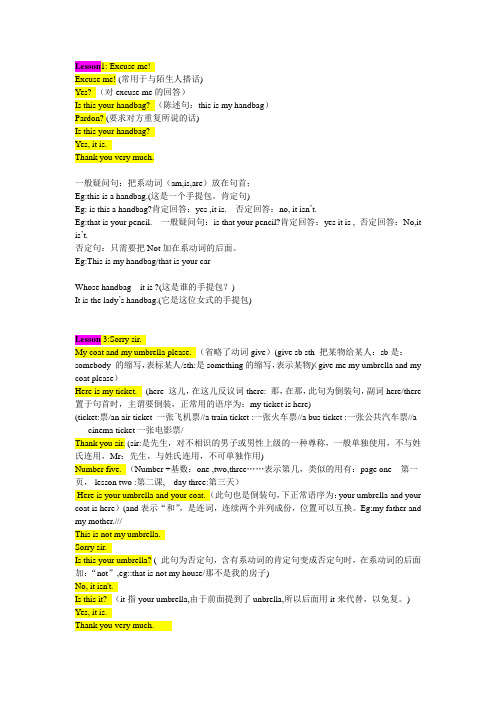
Lesson1: Excuse me!Excuse me! (常用于与陌生人搭话)Yes? (对excuse me的回答)Is this your handbag? (陈述句:this is my handbag)Pardon? (要求对方重复所说的话)Is this your handbag?Yes, it is.Thank you very much.一般疑问句:把系动词(am,is,are)放在句首;Eg:this is a handbag.(这是一个手提包。
肯定句)Eg: is this a handbag?肯定回答:yes ,it is. 否定回答:no, it isn‟t.Eg:that is your pencil. 一般疑问句:is that your pencil?肯定回答:yes it is , 否定回答:No,it is‟t.否定句:只需要把Not加在系动词的后面。
Eg:This is my handbag/that is your carWhose handbag it is ?(这是谁的手提包?)It is the lady‟s handbag.(它是这位女式的手提包)Lesson 3:Sorry sir.My coat and my umbrella please. (省略了动词give)(give sb sth 把某物给某人:sb是:somebody 的缩写,表标某人/sth:是something的缩写,表示某物)(give me my umbrella and my coat please)Here is my ticket. (here 这儿,在这儿反议词there: 那,在那,此句为倒装句,副词here/there 置于句首时,主谓要倒装,正常用的语序为:my ticket is here)(ticket:票/an air ticket 一张飞机票//a train ticket :一张火车票//a bus ticket :一张公共汽车票//a cinema ticket一张电影票/Thank you sir. (sir:是先生,对不相识的男子或男性上级的一种尊称,一般单独使用,不与姓氏连用,Mr:先生,与姓氏连用,不可单独作用)Number five. (Number +基数:one ,two,three……表示第几,类似的用有:page one 第一页, lesson two :第二课, day three:第三天)Here is your umbrella and your coat. (此句也是倒装句,下正常语序为:your umbrella and your coat is here)(and表示“和”,是连词,连续两个并列成份,位置可以互换。
新概念英语第一册Lesson29-30笔记(语法点+配套练习+答案)
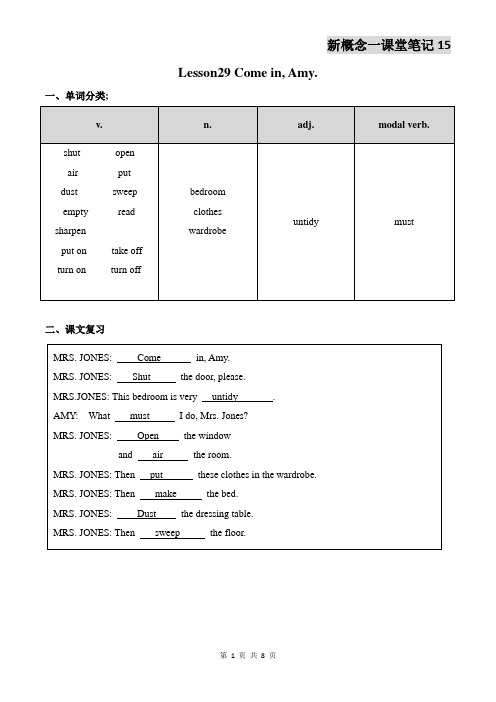
come in
进来
dust the dressing table
给梳妆台除尘
shut the door
关门
sweep the floor
扫地
open the window
开窗
What must I do?
我该做什么?
air the room
给房间通风
put the clothes in the wardrobe
The dustbin is full. Please take the dustbin out andemptyit.
sharpen v.削尖,使...锋利
sharpener n.削笔刀
sharp adj.锋利的
The pencil is blunt.
Get asharpenerandsharpenit.
The floor is dirty, please sweepit.
It’s hot, take offyour coat.
It is dark, turn offthe light.
七、语法练习
1.模仿例句写出相应的祈使句:
Example:The cup isn’t empty.
Empty it!
句型:
肯定句:①Do型:
Look out!/ Stand up! / Shut up!
②Be型:(Be+表语:形容词或名词)
Be careful! பைடு நூலகம் Be yourself! / Be quiet!
③Let型:
Let’s go!我们走!
Let me have a look.让我看一看。
否定句:①Don’t +动词原形
裕兴新概念学习笔记-第一册(29-30)
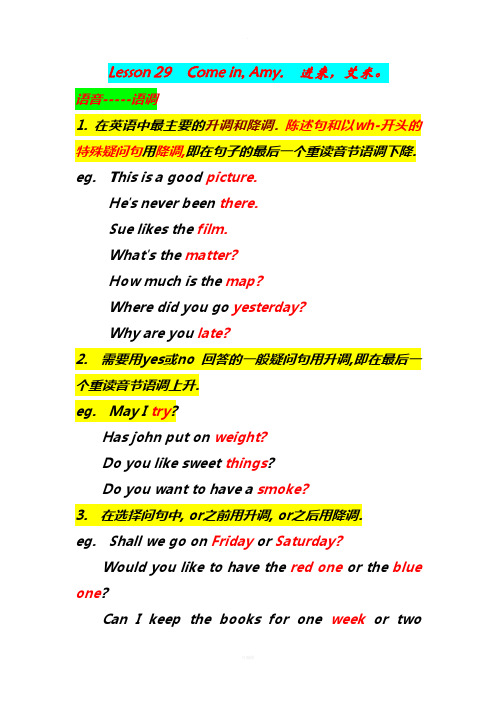
Lesson 29 Come in, Amy. 进来,艾米。
语音-----语调1. 在英语中最主要的升调和降调.陈述句和以wh-开头的特殊疑问句用降调,即在句子的最后一个重读音节语调下降. eg. This is a good picture.He's never been there.Sue likes the film.What's the matter?How much is the map?Where did you go yesterday?Why are you late?2. 需要用yes或no 回答的一般疑问句用升调,即在最后一个重读音节语调上升.eg. May I try?Has john put on weight?Do you like sweet things?Do you want to have a smoke?3. 在选择问句中, or之前用升调, or之后用降调.eg. Shall we go on Friday or Saturday?Would you like to have the red one or the blue one?Can I keep the books for one week or twoweeks?New Words and expressions 生词和短语shut v. 关门bedroom n. 卧室untidy adj. 乱,不整齐must modal verb 必须,应该open v. 打开air v. 使…通风,换换空气put v. 放置clothes n. 衣服wardrobe n. 大衣柜dust v. 掸掉灰尘土mop n. 拖把sweep v. 扫shut v. 关门close v. 关shut the door/ close the door 关上门shut the window /close the window 关上窗户shut up! 闭嘴bedroom n. 卧室living room n. 客厅= sitting room kitchen n. 厨房toliet n. 厕所dining room n. 餐厅study n. 书房balcony n. 阳台basement n. 地下室bathroom n. 卫生局,洗澡间untity adj. 乱, 不整齐un 前缀具有否定意思tidy 整齐的untidy 乱,不整齐happy 快乐的, 幸福的unhappy 不快乐的,不高兴的fair 公平的unfair 不公平的fortunately 幸运地fortune 运气/fortunate 幸运的unfortunately 不幸运地must modal verb 必须,应该情态动词can 能够,会should 应该may 可以,可能情态动词没有人称和数的变化,含有情态动词的句子,其否定句是在情态动词后面加not, 疑问句是把情态动词提前. eg. You must shut the door.你必须关门.He must open the window.他必须打开窗户.They must look at the blackboard.他们必须看黑板.We must go to school.他们必须去上学.否定句是在must后面加not.must not = mustn't 决不能,决不可以eg. She must not open the window.她决对不可以开窗户.You must not play with fire.你们千万不要玩笑.They mustn't watch TV.他们不可以看电视.She mustn't go out.她不可以出去.疑问句是把must 前提,肯定回答: Yes, 主+ must.是的,必须否定回答: No, 主+needn't不,不必了-----Must we go to school?我们必须去上学吗?Yes, you must.是的,必须Must they clean the room?你们必须打扫房间吗?No, they needn't.不,不必了.Must we copy these letters?我们必须抄这些信件吗?No, you needn't不,不必了.Must she answer the question?她必须回答这个问题吗?Yes, she must.是的,必须.No, she needn't不,不必了.open adj. 开着的反义词shut或closeopen minded: 开明的,愿意考虑不同意见和想法的eg. My mother is open-minded.我的妈妈思想很开明.open v. 打开open your mouth 张开你的嘴opening time: 开放时间,营业时间air1. v. 使...通风,换换空气air the room 给房间通风1.n. 空气(不可数名词)eg. Let's go out and breathe some fresh air.咱们出去呼吸一些新鲜空气吧!air bed 气垫air mattress 充气床垫air-conditioner 空调put v. 放置put sth +介词短语把...放在... 地方eg. Put your coat on the chair.把你的外套放在椅子上.Put these boxes on the floor.把这些箱子放在地板上.clothes n. 衣服clothes hanger 衣服挂clothes horse 晾衣架(室内)clothes line 晾衣绳clothes peg (Br) 衣架clothes pin (Am) 衣架clothes tree 衣帽架,放衣架wardrobe n. 大衣柜eg. There are some clothes in the wardrobe.有一些衣服在衣柜里.Put these boxes on the floor.把这些箱子放在地板上.dust1. v. 弹掉灰尘dust the dressing table.弹掉梳妆台上的灰尘.2. n. 灰尘(不可数名词)eg. There is some dust on the desk.在书桌上面有些灰尘.sweep v. 扫sweep the floor 扫地TEXT 课文Listen to the text and answer the question:What must Amy do to clean the room?艾米应该做什么来整理房间呢?How must Amy clean the floor? Sweep it.艾米需要如何来清扫地面?扫地MRS. JONES: Come in, Amy.琼斯夫人:进来,艾米。
新概念一Lesson29-30课堂笔记+课堂总结
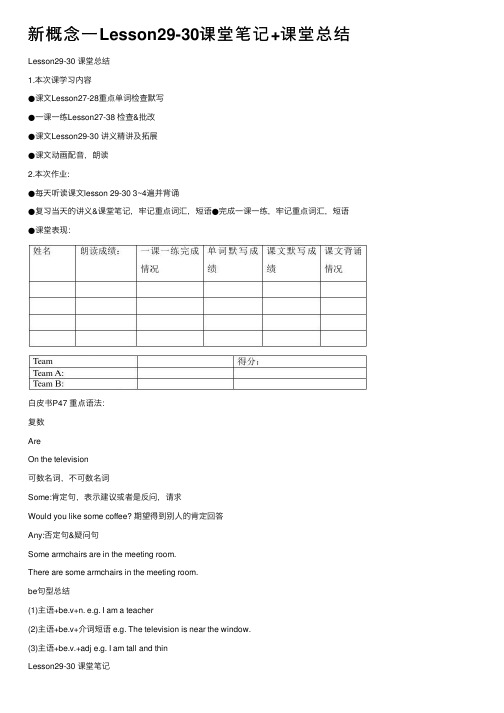
新概念⼀Lesson29-30课堂笔记+课堂总结Lesson29-30 课堂总结1.本次课学习内容●课⽂Lesson27-28重点单词检查默写●⼀课⼀练Lesson27-38 检查&批改●课⽂Lesson29-30 讲义精讲及拓展●课⽂动画配⾳,朗读2.本次作业:●每天听读课⽂lesson 29-30 3~4遍并背诵●复习当天的讲义&课堂笔记,牢记重点词汇,短语●完成⼀课⼀练,牢记重点词汇,短语●课堂表现:⽩⽪书P47 重点语法:复数AreOn the television可数名词,不可数名词Some:肯定句,表⽰建议或者是反问,请求Would you like some coffee? 期望得到别⼈的肯定回答Any:否定句&疑问句Some armchairs are in the meeting room.There are some armchairs in the meeting room.be句型总结(1)主语+be.v+n. e.g. I am a teacher(2)主语+be.v+介词短语 e.g. The television is near the window.(3)主语+be.v.+adj e.g. I am tall and thinLesson29-30 课堂笔记词汇详解:1.shut●同义词:close●反义词:opene.g. 关门:shut the doore.g. shut up! 闭嘴2.bedroome.g. There are three bedrooms , two bathrooms and one kitchen in the apartment. 公寓有3个卧室,2个浴室,1个厨房。
3.Untidyan untidy room:凌乱的房间untidy clothes:⾐冠不整的⾐服an untidy worker:没有条理的⼯⼈拓展:tidy up the room:收拾房间近义词:untidy=mess反义词:tidy=neatgarage 车库basement 地下室4.Must造句:My mother always tells me that.......My mother always tells me that I must study hard.Cystal: I must clean the window.Junjun:I must do my homework.-我必须完成功课吗?Must I finish my homework? you-是的。
新概念英语第一册Lesson29-30

Practice2
What must you do?
Make the bed
What must you do? Sweep the floor.
What must you do?
Put the clothes in the wardrobe.
What must I do?
This bedroom's very untidy.
This bedroom's very clean.
How can we get a clean bedroom?
open the window air the room put the clothes in the wardorbe make the bed dust the dressing table
• This bedroom is untidy.
• ★untidy adj. 乱,不整齐
• un-前缀,表示否定
• un-前缀,表示否定
• tidy--untidy • happy--unhappy • friendly--unfriendly • clear--unclear
• clothes [kləuðz] n.衣服
sharpen / ’ ʃɑːpən/ v. 削尖, 使锋利 put on /’pʊt-ɒn/ 穿上
take off / ’teɪk-ɒf/ 脱掉
turn on / ’ tɜːn -ɒn/ 开(电灯)
turn off / 门、窗、箱子等物品)
open the door / window / box [反] close / shut 关,关上 (门、窗、箱子等物品)
新概念英语第一册第29课
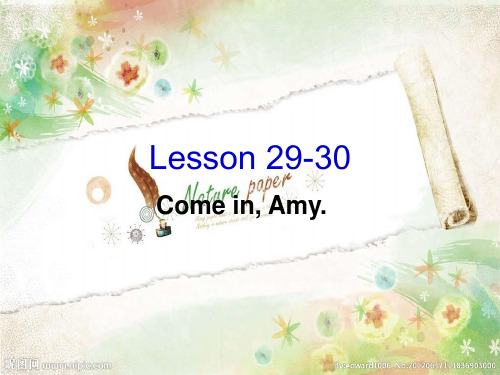
come in shut the door… open the window… air the room… make the bed… dust the dressing table… sweep the floor… put on/take off your clothes… turn on/turn off the stereo… empty the cup… read the magazine… sharpen the knife…
★untidy adj. 乱,不整齐 un-前缀,表示否定;tity adj. 整齐的,干净的 happy——unhappy 不幸福的 lucky——unlucky 不幸的 known——unknown 未知的 ★air v. 使 … 通风,换换空气 ① n. 空气,新鲜空气 Let’s go out and breathe some fresh air. ② n. 空中,空间 He likes to stay in the open air. 他喜欢在户外呆着。 ③ v. 晾(衣服、被褥等);使通风 Leave the trousers on the washing-line to air. 把裤子挂到晾衣绳上去晾干。 ★dust v. 掸掉灰尘土 dust ① v. 掸掉……上的灰尘;② n. 灰尘
衣柜
卧室 关门
打开
使…通风
Hale Waihona Puke 打扫灰尘衣服 不整齐情态动词must的用法: must是情态动词,表示“必须”、“应当” 。 1 情态动词表示人的情感、状态或情绪变化的一种 助动词。 2 情态动词不能单独做谓语,只能和后面的原形动 词一起构成谓语。 3 情态动词没有人称和数格的变化。 4 含有情态动词的句子,否定句在它后面加not, 一般疑问句把它提前。 You must open the window. You mustn't open the window? Must I open the window? Yes, you must. No, you needn't.
新概念英语第一册Lesson_29-30
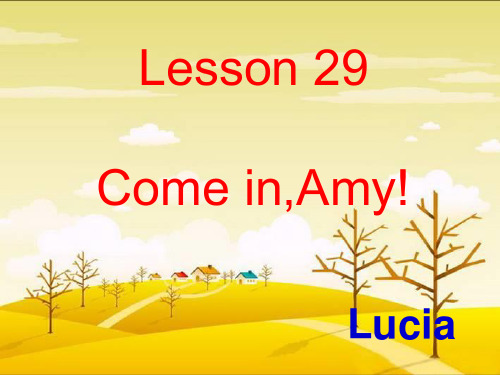
• 1)、must是情态动词。 • 2)、表示必须,不得不做的事情。 • 同时也可以表示不可推卸的责 任。 • 3)、must后面要加动词原型。
• • • • You must do your homework. 你必须写作业。 You must be home at nine. 你必须在九点到家。
table
Empty the
{
cup
bottle
newspaper
Read this
{
magazine
Sharpen these
pencils
Amy is working for you. When she comes to the house, you will be out. Write a list of jobs for Amy. Use some of the verbs from this box.
Open the door. 谓语 开着的(形容词adj.)
• 5.open:打开(动词v.)
• •
•
The door is open. 表语
put on, take off, turn on , turn off的用法
Put on the coat .=Put the coat on. Take off your shoes.= Take your shoes off. Turn on the TV.=Turn the TV on . Turn off the stereo.=Turn the stereo off. put take turn turn sth. on sth. off = sth. on sth.off put on sth. take off sth. turn on sth. turn off sth.
新概念一册lesson29-30祈使句
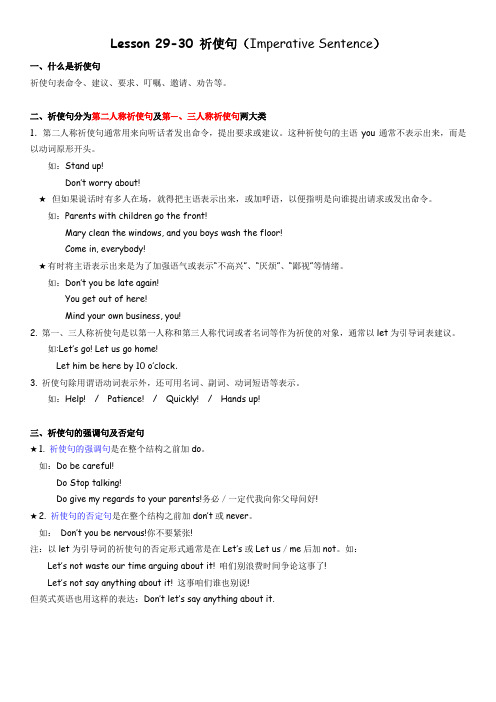
Lesson 29-30 祈使句(Imperative Sentence)一、什么是祈使句祈使句表命令、建议、要求、叮嘱、邀请、劝告等。
二、祈使句分为第二人称祈使句及第—、三人称祈使句两大类1.第二人称祈使句通常用来向听话者发出命令,提出要求或建议。
这种祈使句的主语you通常不表示出来,而是以动词原形开头。
如:Stand up!Don’t worry about!★但如果说话时有多人在场,就得把主语表示出来,或加呼语,以便指明是向谁提出请求或发出命令。
如:Parents with children go the front!Mary clean the windows, and you boys wash the floor!Come in, everybody!★有时将主语表示出来是为了加强语气或表示“不高兴”、“厌烦”、“鄙视”等情绪。
如:Don’t you be late again!You get out of here!Mind your own business, you!2. 第一、三人称祈使句是以第一人称和第三人称代词或者名词等作为祈使的对象,通常以let为引导词表建议。
如:Let’s go! Let us go home!Let him be here by 10 o’clock.3. 祈使句除用谓语动词表示外,还可用名词、副词、动词短语等表示。
如:Help! / Patience! / Quickly! / Hands up!三、祈使句的强调句及否定句★1. 祈使句的强调句是在整个结构之前加do。
如:Do be careful!Do Stop talking!Do give my regards to your parents!务必/一定代我向你父母问好!★2. 祈使句的否定句是在整个结构之前加don’t或never。
如:Don’t you be nervous!你不要紧张!注:以let为引导词的祈使句的否定形式通常是在Let’s或Let us/me后加not。
新概念第一册 Lesson-29-30 Come in, Amy(情态动词)
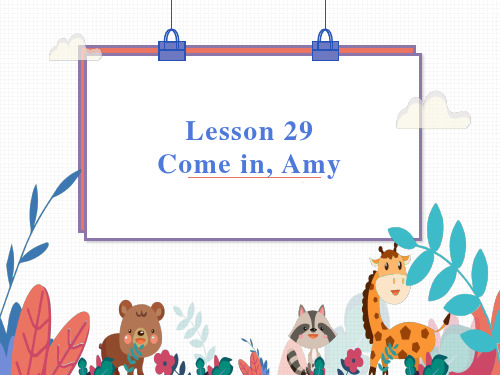
Listen and Answer the question: What color is the electric cooker?
MRS. JONES: Come in, Amy.
MRS.JONES: Shut the door, please.
MRS.JONES: This bedroom’s very untidy.
put on
put on /ˈput ɔn/ 穿上 take off /ˈteɪk ɔːf/ 脱掉
turn
turn on /ˈtɜːn- ɔn/ 开(电灯) turn off /ˈtɜːn-ɔf/ 关(电灯)
What must I do?
What must I do?
What must I do?
Lesson 30 What must I do?
New Words and Expressions
empty /ˈempti/ v. 倒空,使……变空 take off /ˈteɪk ɔːf/ 脱掉
read /ri:d/ v. 读
turn on /ˈtɜːn- ɔn/ 开(电灯)
sharpen / ˈʃɑːpən/ v. 削尖,使锋利 turn off /ˈtɜːn-ɔf/ 关(电灯)
Homework 1. 抄写单词2遍,完成课后习题 2. 熟读L29课
• E.g. Must I sweep the floor? Yes, you must. No, you needn’t. • 我必须扫地吗?是的,你必须这样做。/不,你不需要。
• E.g. Can I borrow this book? Yes, you may./No you may not. 我能借这本书吗?是的,你可以借。/不,你不可以借。
新概念英语第一册Lesson_29-30[1]
![新概念英语第一册Lesson_29-30[1]](https://img.taocdn.com/s3/m/84dbd01359eef8c75fbfb3cd.png)
祈使句
• 祈使句常常是表达说话人对对方的劝告、 叮嘱、请求或命令等。 • 祈使句中一般省略了主语you。 • 在表达请求或劝告时,在祈使句前或句末 可加上please,以使句子的语气更加缓和 或客气。 • Open the window, please. • Come in, please.
祈使句肯定句式:
• dust [dʌst] v. 掸掉 n.灰尘 • dressing table • dust the dressing table.
• sweep [swi:p] v. 扫 • sweep the floor
• Listen to the text, and answer the question. • How must Amy clean the floor?
三、选择题。
• • • • • • ( C)1.The door is open. You must ____ it. A. open B. opens C. shut D. shuts (B )2.Don’t put on this watch. ______. A.Take off it B.Take it off C.Put it on D.Put on it (A )3.That’s ____ nice car and ____colour is nice,too. A.a , its B.a , it’s C.one , it D.an , its (A )4.What must Amy ____? A.do B.does C.doing D.to do ( B)5.Give your book ____ him, please. A.in B.to C.at D.on
• 注:Please可用于祈使句的句首(其后通常 不用逗号)或句末(其前通常用逗号)。如: • Please don’t get angry. 请不要生气。 • Don’t drive too fast,please. 请开得慢一点。
裕兴新概念学习笔记第一册2930
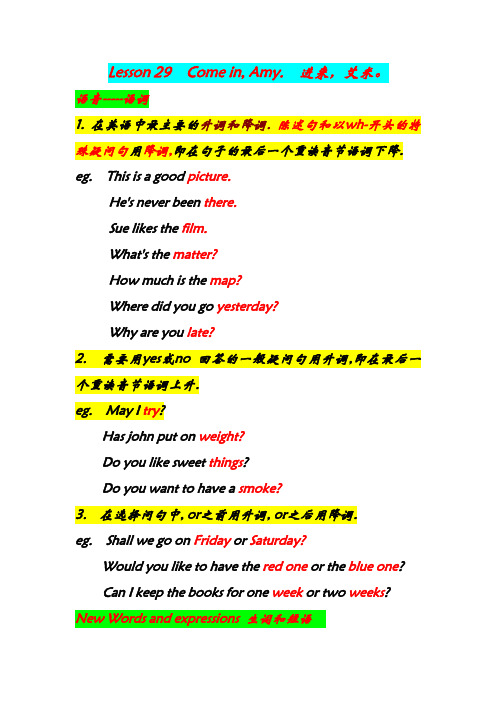
Lesson 29 Come in, Amy. 进来,艾米。
语音-----语调1. 在英语中最主要的升调和降调.陈述句和以wh-开头的特殊疑问句用降调,即在句子的最后一个重读音节语调下降. eg. This is a good picture.He's never been there.Sue likes the film.What's the matter?How much is the map?Where did you go yesterday?Why are you late?2. 需要用yes或no 回答的一般疑问句用升调,即在最后一个重读音节语调上升.eg. May I try?Has john put on weight?Do you like sweet things?Do you want to have a smoke?3. 在选择问句中, or之前用升调, or之后用降调.eg. Shall we go on Friday or Saturday?Would you like to have the red one or the blue one?Can I keep the books for one week or two weeks? New Words and expressions 生词和短语shut v. 关门bedroom n. 卧室untidy adj. 乱,不整齐must modal verb 必须,应该open v. 打开air v. 使…通风,换换空气put v. 放置clothes n. 衣服wardrobe n. 大衣柜dust v. 掸掉灰尘土mop n. 拖把sweep v. 扫shut v. 关门close v. 关shut the door/ close the door 关上门shut the window /close the window 关上窗户shut up! 闭嘴bedroom n. 卧室living room n. 客厅= sitting room kitchen n. 厨房toliet n. 厕所dining room n. 餐厅study n. 书房balcony n. 阳台basement n. 地下室bathroom n. 卫生局,洗澡间untity adj. 乱, 不整齐un 前缀具有否定意思tidy 整齐的untidy 乱,不整齐happy 快乐的, 幸福的unhappy 不快乐的,不高兴的fair 公平的unfair 不公平的fortunately 幸运地fortune 运气/fortunate 幸运的unfortunately 不幸运地must modal verb 必须,应该情态动词can 能够,会should 应该may 可以,可能情态动词没有人称和数的变化,含有情态动词的句子,其否定句是在情态动词后面加not, 疑问句是把情态动词提前.eg. You must shut the door.你必须关门.He must open the window.他必须打开窗户.They must look at the blackboard.他们必须看黑板.We must go to school.他们必须去上学.否定句是在must后面加not.must not = mustn't 决不能,决不可以eg. She must not open the window.她决对不可以开窗户.You must not play with fire.你们千万不要玩笑.They mustn't watch TV.他们不可以看电视.She mustn't go out.她不可以出去.疑问句是把must 前提,肯定回答: Yes, 主+ must.是的,必须否定回答: No, 主+needn't不,不必了-----Must we go to school?我们必须去上学吗?Yes, you must.是的,必须Must they clean the room?你们必须打扫房间吗?No, they needn't.不,不必了.Must we copy these letters?我们必须抄这些信件吗?No, you needn't不,不必了.Must she answer the question?她必须回答这个问题吗?Yes, she must.是的,必须.No, she needn't不,不必了.open adj. 开着的反义词shut或closeopen minded: 开明的,愿意考虑不同意见和想法的eg. My mother is open-minded.我的妈妈思想很开明.open v. 打开open your mouth 张开你的嘴opening time: 开放时间,营业时间air1. v. 使...通风,换换空气air the room 给房间通风1.n. 空气(不可数名词)eg. Let's go out and breathe some fresh air.咱们出去呼吸一些新鲜空气吧!air bed 气垫air mattress 充气床垫air-conditioner 空调put v. 放置put sth +介词短语把...放在... 地方eg. Put your coat on the chair.把你的外套放在椅子上.Put these boxes on the floor.把这些箱子放在地板上.clothes n. 衣服clothes hanger 衣服挂clothes horse 晾衣架(室内) clothes line 晾衣绳clothes peg (Br) 衣架clothes pin (Am) 衣架clothes tree 衣帽架,放衣架wardrobe n. 大衣柜eg. There are some clothes in the wardrobe.有一些衣服在衣柜里.Put these boxes on the floor.把这些箱子放在地板上.dust1. v. 弹掉灰尘dust the dressing table.弹掉梳妆台上的灰尘.2. n. 灰尘(不可数名词)eg. There is some dust on the desk.在书桌上面有些灰尘.sweep v. 扫sweep the floor 扫地TEXT 课文Listen to the text and answer the question:What must Amy do to clean the room?艾米应该做什么来整理房间呢?How must Amy clean the floor? Sweep it.艾米需要如何来清扫地面?扫地MRS. JONES: Come in, Amy.琼斯夫人:进来,艾米。
新概念英语第一册第29-30重点
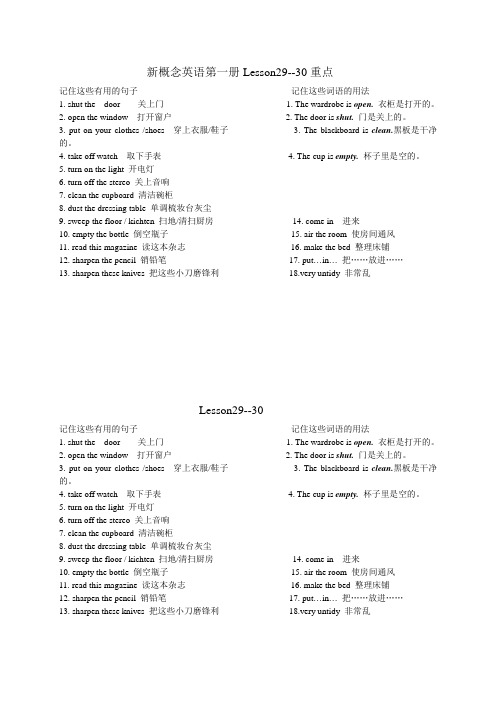
新概念英语第一册Lesson29--30重点记住这些有用的句子记住这些词语的用法1. shut the door 关上门 1. The wardrobe is open. 衣柜是打开的。
2. open the window 打开窗户 2. The door is shut. 门是关上的。
3. put on your clothes /shoes 穿上衣服/鞋子 3. The blackboard is clean.黑板是干净的。
4. take off watch 取下手表 4. The cup is empty. 杯子里是空的。
5. turn on the light 开电灯6. turn off the stereo 关上音响7. clean the cupboard 清洁碗柜8. dust the dressing table 单调梳妆台灰尘9. sweep the floor / kichten 扫地/清扫厨房14. come in 进来10. empty the bottle 倒空瓶子15. air the room 使房间通风11. read this magazine 读这本杂志16. make the bed 整理床铺12. sharpen the pencil 销铅笔17. put…in…把……放进……13. sharpen these knives 把这些小刀磨锋利18.very untidy 非常乱Lesson29--30记住这些有用的句子记住这些词语的用法1. shut the door 关上门 1. The wardrobe is open. 衣柜是打开的。
2. open the window 打开窗户 2. The door is shut. 门是关上的。
3. put on your clothes /shoes 穿上衣服/鞋子 3. The blackboard is clean.黑板是干净的。
新概念英语第一册第29-30课教程文件_2022年学习资料
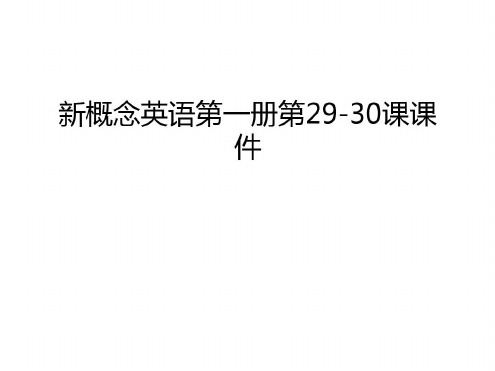
Phrases-How to tidy a room?-Open the window-2.Air the room-3.-Put these clothes in the wardrobe-4.-Make the bed-5.-Dust the dressing table-6.Sweep the floor.-翮
否定形式:do not1don't+动词原形+其他-Do not come in.-不要进来。-Don't worry.-不要担心。-Don't be late.-不要迟到-彩-潮-祸
三、exercise-P35.六句型转换(练习册)-1.判断句型-2.找出情态动词+动词原形+特殊疑问词+ 语-3.排序-疑问句:情态动词+主语+动原形(一般)-特殊疑问词+情态动词+主语+动原形(特殊)-陈述句: 语+情态动词+动原形(肯定形式/否定形式)
练习册P34新概念英语第一册第29-30课课件教程文件
此课件下载可自行编辑修改,仅供参考!-感谢您的支持,我们努力做得更好!谢谢
疑问句:-特--Must I g to work every day?一般疑问句---Yes,you mu t!/No,you needn't!-想atimust I do?特殊疑问句-剂-特殊疑问词:what,w ere,.when,-which,why,how
■祈使句-1.表达命令或指示,提出要求、建议、劝-告等。-2.一般省略主语you,动词采用原形-3.肯定形 +否定形式-肯定形式:动词原形+其他--Be careful..小心。--Open the window. 开窗户。-Shut the door..关门
- 1、下载文档前请自行甄别文档内容的完整性,平台不提供额外的编辑、内容补充、找答案等附加服务。
- 2、"仅部分预览"的文档,不可在线预览部分如存在完整性等问题,可反馈申请退款(可完整预览的文档不适用该条件!)。
- 3、如文档侵犯您的权益,请联系客服反馈,我们会尽快为您处理(人工客服工作时间:9:00-18:30)。
Lesson 29 Come in, Amy. 进来,艾米。
语音-----语调1. 在英语中最主要的升调和降调.陈述句和以wh-开头的特殊疑问句用降调,即在句子的最后一个重读音节语调下降. eg. This is a good picture.He's never been there.Sue likes the film.What's the matter?How much is the map?Where did you go yesterday?Why are you late?2. 需要用yes或no 回答的一般疑问句用升调,即在最后一个重读音节语调上升.eg. May I try?Has john put on weight?Do you like sweet things?Do you want to have a smoke?3. 在选择问句中, or之前用升调, or之后用降调.eg. Shall we go on Friday or Saturday?Would you like to have the red one or the blue one?Can I keep the books for one week or two weeks? New Words and expressions 生词和短语shut v. 关门bedroom n. 卧室untidy adj. 乱,不整齐must modal verb 必须,应该open v. 打开air v. 使…通风,换换空气put v. 放置clothes n. 衣服wardrobe n. 大衣柜dust v. 掸掉灰尘土mop n. 拖把sweep v. 扫shut v. 关门close v. 关shut the door/ close the door 关上门shut the window /close the window 关上窗户shut up! 闭嘴bedroom n. 卧室living room n. 客厅= sitting room kitchen n. 厨房toliet n. 厕所dining room n. 餐厅study n. 书房balcony n. 阳台basement n. 地下室bathroom n. 卫生局,洗澡间untity adj. 乱, 不整齐un 前缀具有否定意思tidy 整齐的untidy 乱,不整齐happy 快乐的, 幸福的unhappy 不快乐的,不高兴的fair 公平的unfair 不公平的fortunately 幸运地fortune 运气/fortunate 幸运的unfortunately 不幸运地must modal verb 必须,应该情态动词can 能够,会should 应该may 可以,可能情态动词没有人称和数的变化,含有情态动词的句子,其否定句是在情态动词后面加not, 疑问句是把情态动词提前.eg. You must shut the door.你必须关门.He must open the window.他必须打开窗户.They must look at the blackboard.他们必须看黑板.We must go to school.他们必须去上学.否定句是在must后面加not.must not = mustn't 决不能,决不可以eg. She must not open the window.她决对不可以开窗户.You must not play with fire.你们千万不要玩笑.They mustn't watch TV.他们不可以看电视.She mustn't go out.她不可以出去.疑问句是把must 前提,肯定回答: Yes, 主+ must.是的,必须否定回答: No, 主+needn't不,不必了-----Must we go to school?我们必须去上学吗?Yes, you must.是的,必须Must they clean the room?你们必须打扫房间吗?No, they needn't.不,不必了.Must we copy these letters?我们必须抄这些信件吗?No, you needn't不,不必了.Must she answer the question?她必须回答这个问题吗?Yes, she must.是的,必须.No, she needn't不,不必了.open adj. 开着的反义词shut或closeopen minded: 开明的,愿意考虑不同意见和想法的eg. My mother is open-minded.我的妈妈思想很开明.open v. 打开open your mouth 张开你的嘴opening time: 开放时间,营业时间air1. v. 使...通风,换换空气air the room 给房间通风1.n. 空气(不可数名词)eg. Let's go out and breathe some fresh air.咱们出去呼吸一些新鲜空气吧!air bed 气垫air mattress 充气床垫air-conditioner 空调put v. 放置put sth +介词短语把...放在... 地方eg. Put your coat on the chair.把你的外套放在椅子上.Put these boxes on the floor.把这些箱子放在地板上.clothes n. 衣服clothes hanger 衣服挂clothes horse 晾衣架(室内) clothes line 晾衣绳clothes peg (Br) 衣架clothes pin (Am) 衣架clothes tree 衣帽架,放衣架wardrobe n. 大衣柜eg. There are some clothes in the wardrobe.有一些衣服在衣柜里.Put these boxes on the floor.把这些箱子放在地板上.dust1. v. 弹掉灰尘dust the dressing table.弹掉梳妆台上的灰尘.2. n. 灰尘(不可数名词)eg. There is some dust on the desk.在书桌上面有些灰尘.sweep v. 扫sweep the floor 扫地TEXT 课文Listen to the text and answer the question:What must Amy do to clean the room?艾米应该做什么来整理房间呢?How must Amy clean the floor? Sweep it.艾米需要如何来清扫地面?扫地MRS. JONES: Come in, Amy.琼斯夫人:进来,艾米。
MRS. JONES: Shut the door, please.琼斯夫人:请把门关上。
MRS. JONES: This bedroom's very untidy.琼斯夫人:这卧室太不整洁了。
MAY: What must I do, Mrs. Jones?艾米:我应该做些什么呢,琼斯夫人?MRS. JONES: Open the window and air the room.琼斯夫人:打开窗子,给房间通通风。
MRS. JONES: Then put these clothes in the wardrobe. 琼斯夫人:然后把这些衣服放进衣橱里去。
MRS. JONES: Then make the bed.琼斯夫人:再把床整理一下。
MRS. JONES: Dust the dressing table.琼斯夫人:掸掉梳妆台上的灰尘。
MRS. JONES: Then sweep the floor.琼斯夫人:然后扫扫地。
课文讲解:A: Come in, Amy.进来,艾米。
A: Shut the door, please.请把门关上。
这是一句祈使句,祈使句一般省略主语"you", 动词要用原形. 祈使句用来表示直接的命令,建议,告诫或邀请等多种意思.eg. Give me some glasses, please.请给我一些玻璃杯.Shut the door.关门Go and buy some new clothes.去买些新衣服.A: Come in, Amy. 进来, Amy. (祈使句)A: Shut the door, please. 请把门关上。
(祈使句)祈使句的否定句就是在祈使句前面加个"don't"eg. Don't open the door!别开门!Don't shut the window!别关窗!Don't give me this magazine.不要给我这本杂志.Don't put your dress on the bed.不要把你的连衣裙放在床上.否定句: Don’t shut the door, please! 请别关门.A: This bedroom's very untidy. bedroom’s=bedroom is 这卧室太不整洁了。
B: What must I do, Mrs. Jones?我必须做些什么呢. 琼斯夫人?这句话即有情态动词must, 又有实意动词do. 实意动词是指有实在意义的动词, 如: eat (吃), drink (喝) .含有系动词be的特殊疑问句的结构;特殊疑问词+be+主语含有实义动词的特殊疑问句的结构:特殊疑问句+助动词或情态动词+主语+谓语eg. What must I do? 我应该做什么?what:特殊疑问句must: 情态动词I : 主语do:谓语eg. What must he do?他应该做什么?What must they do?他们必须做什么?A: Open the window and air the room.打开窗子,给房间通通风。
( 祈使句,省略了主语you.) A: Then put these clothes in the wardrobe.然后把这些衣服放进衣橱里去。
then 表示"然后"eg. Eat some bread, then drink some water.吃些面包,然后喝些水.put sth +介词短语eg. Put the trousers on the bed.把裤子放在床上.A: Then make the bed.再把床整理一下。
